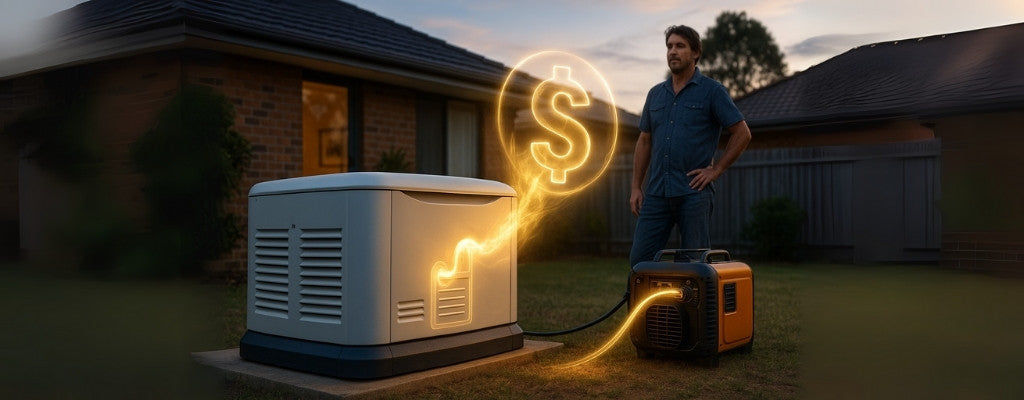
Are Generators Eligible for Tax Credit?
Wondering if your new Generator could land you a tax break? The short answer: sometimes – but only if it fits into very specific energy-efficient or renewable categories. Stick with me and I’ll walk you through which ones might qualify, the paperwork you’ll need, and how Aussies can claim back every cent they’re entitled to.

The Federal Generator Tax Credit
In Australia, the government offers a range of tax credits to encourage energy-efficient investments. A standard diesel or petrol unit usually won’t get you a credit. But if your Generator runs on renewable energy, such as solar or biofuel, you may be in luck.
These credits work differently to deductions. Instead of reducing your taxable income, they cut your tax bill directly, dollar for dollar. That means if you’re eligible, the savings can be significant.
What Appliances Qualify for an Energy Tax Credit?
Not every bit of kit makes the cut. Appliances that improve energy efficiency or use renewable sources usually qualify, such as solar panels, wind turbines, and in some cases renewable-powered Generators.
They need to meet specific performance standards to be eligible. Always double-check the Australian Taxation Office (ATO) rules before you make a claim to avoid any nasty surprises.

Natural Gas Generator Tax Credit Eligibility
Natural gas Generators sit in a tricky middle ground. They’re cleaner than petrol or diesel, but they’re not exactly renewable. In some setups, particularly when used as part of combined heat and power systems, they may be considered eligible.
Because the rules aren’t always clear, this is one area where professional tax advice is worth its weight in gold.
The Residential Clean Energy Generator Tax Credit
If you’re thinking of installing a solar-powered or hybrid Generator at home, you may be able to claim the Residential Clean Energy tax credit. These incentives are designed to help households make the jump to greener power.
You’ll need to keep all your paperwork – receipts, compliance documents, and installation certificates. Without proof, your claim will almost certainly be rejected.

Understanding Other Generator Tax Deductions
Not all benefits come in the form of credits. In some situations, you may be able to claim deductions instead, which reduce your taxable income rather than your tax bill directly.
Generators bought for essential household or business needs often fall into this category, particularly when linked to medical or work requirements.
The Generator for Medical Equipment Tax Deduction
Some families rely on Generators to power life-saving medical gear during blackouts. In these cases, while you may not qualify for renewable energy credits, the purchase and running costs can sometimes be claimed as medical expenses.
The ATO has specific guidelines, so it’s worth confirming with a registered tax agent to ensure you’re covered.
Claiming Your Generator as a Business Expense
For businesses, Generators are often considered a capital expense. Think of a café needing backup power to save stock during an outage, or a building site running tools off-grid.
In these cases, the cost of buying, installing, and maintaining the Generator can usually be deducted from taxable income. This is one of the most common ways Aussie businesses claim Generator-related tax benefits.

State-Specific Generator Incentives
In addition to federal rules, some states provide their own rebates or incentives for energy-efficient systems. These are often targeted at areas hit hard by natural disasters like bushfires or cyclones, where reliable power is essential.
The catch? State programs vary widely, and they can change from year to year. It’s always worth checking with your local authority for up-to-date information before you make a purchase.
How to Properly Claim a Generator Tax Benefit
If you want to make a claim, you’ll need to be organised. Keep every receipt, installation certificate, and compliance record in a safe place. Without proper paperwork, your claim won’t get far.
Make sure your claim lines up with ATO requirements or state-based rules. And if your setup is complex – like a hybrid solar-diesel system or a medical deduction – it’s smart to get a professional tax agent involved. They’ll make sure you don’t miss out on benefits you’re entitled to.
Conclusion
Buying a Generator isn’t cheap, but in some cases it can come with financial perks if it meets certain conditions. Renewable-powered units are the most likely to qualify for credits, while business and medical use often allow deductions.
The key is knowing which rules apply to you, keeping all your documents, and checking both federal and state incentives. Done right, you’ll not only protect your home or business with backup power but also shave something off your tax bill.




